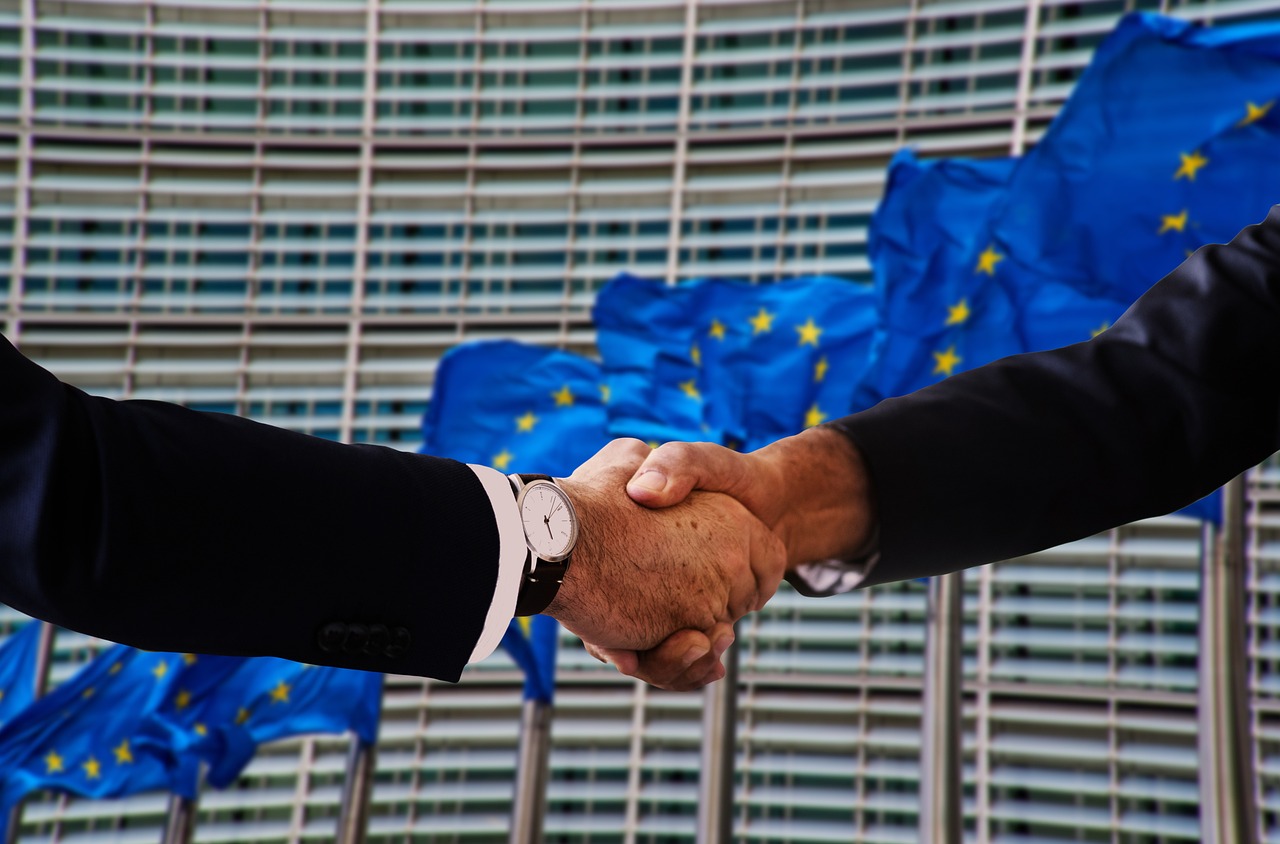Blog

The Informal Turn: Soft Law Regulatory Frameworks in EU External Relations?
The use of soft law in the external dimension of EU migration law has become particularly visible recently. However, this might be a sign of a more general path to soft regulation undertaken by the EU in external affairs. Through a survey of Memoranda of Understanding from 1974 to 2019, Ilaria Ronconi and Salvo Nicolosi explain that the EU has been increasingly relying on soft law arrangements, but its use differs across various policy areas, with major risks for the constitutional fabric of EU law, especially in the area of migration.
Ilaria Ronconi is an LLM student in European Law at Utrecht University.
Salvo Nicolosi is a RENFORCE Senior Researcher and Associate Professor in European and International Law at Utrecht University Law School.

Taking Stock of the European Commission’s 2019-2024 Mandate in the Agri-food Sector: What Progress Towards Sustainability?
At the end of the European Commission 2019-2024 mandate, this post reflects on the legislative changes proposed by the European Commission to improve the sustainability of the agri-food sector. Overall, the new regulatory developments can be seen as a positive step towards sustainability in the sector, but much remains to be done as the definition of sustainability remains unclear and many areas do not appear to be on the path to sustainability, argues Clara Colonna.

Imbalance of Power in the Copyright Tug-of-War between Press Publishers and Internet Service Providers: The Example of Poland’s implementation of Digital Single Market Directive
The rise of digital platforms like Google and Facebook has transformed the media landscape, allowing them to distribute press publishers’ content while often monetising it without fair compensation. To address this, the EU introduced the Digital Single Market Directive (DSM), aiming to ensure fair use and remuneration for publishers. However, Poland’s implementation of the DSM has faced significant hurdles, revealing the challenges in establishing effective secondary rights for publishers and enforcement mechanisms, argues Malgorzata Kozak.

The European Defence Industry Programme: Revolution or Repetition?
In March, the European Commission proposed its Defence Industrial Strategy and accompanying Regulation aimed at achieving “structural defence readiness.” Although promoted as a paradigm shift, the proposed Regulation contains little innovation compared to earlier initiatives and is unlikely to fix the industry’s problems, argues Isaak de Kroon.

Ukraine War Reparations: The Legality of Confiscating Russian Assets
There are plans, especially in the West, to confiscate Russian assets with a view to transferring them to Ukraine. These plans are in tension with international law. New customary international law could crystallize, but normative developments would need the support of non-Western states to legally materialize, argues Cedric Ryngaert.

Green Crimes and Ecojustice
The conference ‘Green Crimes & Ecojustice’ was held at Utrecht University in May 2023. This conference provided a unique opportunity to hear more on the increasingly important and broad fields of green criminology, environmental sociology, environmental law, political ecology, and conservation studies, and how these are engaged with the full spectrum of crimes and harms against the environment.
Professor Nigel South and Dr Daan van Uhm, coordinator of the RENFORCE Building Block on Illicit Environmental Markets, were interviewed by Gemma Venhuizen from the Dutch daily NRC Handelsblad, who wrote an article for the newspaper. A translation is shared in this blogpost.

The Foreign Subsidies Regulation: The Extraterritorial Tax Dimension
In the fourth post in the Renforce Blog Series on the Foreign Subsidies Regulation, Dionysios Pelekis looks at the notion of a “subsidy” in relation to the notion of State aid, and discusses the extraterritorial fiscal implications of the Regulation. Taxation, and the ability to carry out economic, social, and industrial policy via the tax system, is a central aspect of sovereignty. However, due to the width of the notion of a subsidy, and to the scope of the Regulation, this new instrument seems capable of affecting the tax affairs of third countries.

The Foreign Subsidies Regulation: A Paradigm Shift in EU Competition Policy
The European Union (EU) has taken a significant step in addressing the challenges posed by foreign subsidies through the introduction of the Foreign Subsidies Regulation (FSR). The FSR, which applies from today, fills the void that existed between competition and state aid law, introducing an interdisciplinary approach to market governance. In this blogpost, the third in a special series on the FSR, Jasper Sluijs navigates some of the key aspects of this regulation and their potential consequences for EU competition law.

The Foreign Subsidies Regulation: Questions of Democratic Accountability
In the second post in a Renforce special series on the Foreign Subsidies Regulation (FSR), Thomas Verellen looks at the regulation – which applies as of today – from the angle of democratic accountability. In response to geopolitical unrest, the global expansion of state capitalism, and the climate crisis, the EU has significantly strengthened the European Commission’s unilateral trade policy toolbox. How the Commission can be held democratically accountable as it starts to yield its newfound powers, he argues, should be top of mind for everybody concerned about the democratic credentials of the European Union. The FSR cannot be seen in isolation from this broader context.

Introducing the Foreign Subsidies Regulation: New regulatory regime and enforcement powers for the EU
In this piece, the five-part RENFORCE blog series on the new Foreign Subsidies Regulation (FSR) is introduced by Urszula Jaremba.
The FSR – adopted in December 2022, and due to enter into force next week – is an extraordinary piece of EU legislation. Whereas its primary goal is to address distortions on the internal market brought on by subsidies granted by non-EU governments to undertakings active in the EU, the new rules interact and intersect with various EU regulatory regimes in the areas of antitrust, public procurement, and Common Commercial Policy. At the same time, under this novel regulatory regime, the European Commission is designated new, extensive and exclusive enforcement powers which, in turn, give rise to various questions of institutional and constitutional nature pertaining to the democratic foundations of the European Union.
Whereas this blog post offers a general introduction to this new and fascinating regulatory regime and its main features, other authors (details below) will shed light on the FSR from the perspective of their own academic disciplines.

The Law and Practice of Global ICT Standardization: Economic Governance through Private Standards Bodies
The functioning of technologies largely relies on standards – technical specifications that ensure that devices, systems and networks “talk” to each other. Due to the rapid pace of digital development, standards are increasingly assuming regulatory, economic and societal roles. How do these standards come to being? How, if at all, can their increasing regulatory function be legitimized? And what is their role in the current legal order? In her new book, Olia Kanevskaia attempts to provide answers to these and many other legal questions arising around ICT standardization.
EU sanctions against Russia: does the duty to freeze assets of listed persons also extend to their voting rights in corporations?
For Cedric Ryngaert, there are limits to the duty to freeze assets of persons listed under the EU sanctions regime against Russia. In particular, he approves of a recent decision of the District Court of Amsterdam, which held that a listed shareholder in a Dutch corporation should not be barred from voting regarding matters of corporate governance. He argues that such voting need not result in funds being transferred to Russia, which could be used to fund the war in Ukraine. Still, he believes that the Court of Justice of the EU may want to give more guidance on the matter on the basis of a preliminary ruling.

Spotify, Joe Rogan and the Digital Services Act – the Sound of Issues to Come?

For Ruairí Harrison and Anne Koopmans, as the intrigue into the final contours of the Digital Services Act (DSA) is displaced by an anticipation as to the Act’s impact on both the user experience and platform transparency, the emphasis on social media platforms is hard to avoid. Yet as the dust similarly settles on the Joe Rogan-Neil Young controversy for Spotify, how will the DSA impact Europe’s leading streaming service? Further, is the DSA appropriately ‘future proof’ to address Spotify’s increasingly diversified business model or is there a necessity for focused regulatory action on digital streaming services?
The Application of the Comparator Approach by the CJEU in Gender Recognition Cases
In November 2020, the European Commission published its LGBTIQ Equality Strategy 2020-2025, committing to improving the recognition of trans and non-binary identities, and intersex people. For Leens van Kessel, LLB student at Utrecht University, the European protection of the human rights of transgender persons would benefit from a clearer application of what she dubs the ‘comparator approach’ in CJEU cases regarding discrimination on grounds of gender recognition.
The Case of EncroChat and the Presumption of Innocence in EU Law
What if law enforcement had the power to take down an entire phone network? How comfortable would you feel if your messages were exposed and viewed at length? When the EncroChat network was compromised by French law enforcement in 2020, questions were raised not only about the capability to access highly secure information, but also how the presumption of innocence is afforded to criminal suspects pre-trial. For current Utrecht LLM student Suzanne Flynn, as trends in law enforcement progress towards detection rather than reaction, the takedown of the EncroChat network encapsulates a sea change in the area of encryption and the law enforcement response thereto.

The EU’s Media Freedom Act – Bolstering Core Union Values through the Narrow Prism of the Internal Market?

When the European Commission announced its upcoming Media Freedom Act (MFA) last year, many were taken aback by what seemed a bold step into the Fourth Pillar of Democracy. Yet within months of its announcement, the indispensable nature of a pluralistic media would be brought to bear beyond the former Eastern Bloc as Russian citizens fail to recognise the atrocities their armed forces are committing in Ukraine due to the non-existence of independent Russian media. As media freedom is also contracting in Europe, Ruairí Harrison assesses the Commission’s proposed approach to both reimagine and reinforce media freedom in the EU-27.
The CJEU judgments in C-117/20 bpost and C-151/20 Nordzucker: Fundamental rights as a vehicle for hybrid enforcement mechanisms?
In its recent judgments in bpost and Nordzucker, the CJEU held – in essence – that to prevent a violation of the ne bis in idem guarantee in Article 50 of the Charter of Fundamental Rights of the European Union, public authorities need to cooperate and coordinate their punitive enforcement actions, also when they are active in different policy areas or in other jurisdictions. According to Michiel Luchtman, the paradoxical result seems to be that to prevent one fundamental right from being violated, it is necessary to accept (sometimes intrusive) interferences with other rights. Has the Court now entered a slippery slope, eliminating fundamental rights barriers, to promote the effective enforcement of EU law? And if so, at the expense of what?
Security-driven EU-Ukraine relationships within and beyond the Eastern Neighbourhood Policy
Ukraine is ‘one of us and we want them in’, said European Commission President Ursula von der Leyen on 27 February 2022, in response to Ukraine’s bid for membership. In this post, Machiko Kanetake argues that the EU’s response regarding Ukraine’s accession should not reproduce a fundamental ambivalence underlying the EU’s relations with its eastern neighbourhood.
This post is the fifth and last in a series drawing on a RENFORCE expert seminar on the EU’s response to the war in Ukraine, held online on 8th March 2022. It follows analysis of the EU’s response to the migratory flow, the EU’s decision to provide weapons to Ukraine, the EU’s economic sanctions, and the role of social media in times of war.
The role of information and social media warfare in the Ukrainian conflict
Since the start of the Russian invasion of Ukraine, European media and social networks have been flooded with information and videos from both sides. The info-media war between Russia and Ukraine plays a key role in this conflict. For guest contributor Noemi Mena Montes, Ukraine is winning the narrative – read her blogpost to understand how.
The post is the fourth in a series drawing on a RENFORCE expert seminar on the EU’s response to the war in Ukraine, held online on 8th March 2022, and follows analysis of the EU’s response to the migratory flow from Ukraine, the EU’s decision to provide weapons to Ukraine, and the EU’s economic sanctions against Russia. Stay tuned to RENFORCE Blog for further commentary on the EU’s neighbourhood policies and Ukraine.
Defending a Rules-Based International Order? The EU’s Adoption of Restrictive Measures in Response to Russia’s Invasion of Ukraine
The EU has adopted unprecedented “massive and targeted sanctions” in response to Russia’s ‘Special Military Operation’ in Ukraine. For Alexandra Hofer, the sanctioners are demonstrating “unmatched levels of coordination” but are struggling to garner additional international support. If the objective is to change Russia’s behaviour, she argues, the EU and its partners need to be clearer about the sanctions’ objectives. However, Russia (unsurprisingly no doubt) does not perceive the sanctions as legitimate and does not appear to believe the sanctioners are willing to lift the measures.
The post is the third in a series drawing on a RENFORCE expert seminar on the EU’s response to the war in Ukraine, held online on 8th March 2022. Click here to read Salvatore Nicolosi on the EU’s response to the migratory flow from Ukraine, and here for Nathan Meershoek on the EU’s decision to provide weapons to Ukraine. Stay tuned to RENFORCE Blog for further analysis of the EU’s neighbourhood policies and Ukraine, and of coverage of the war in the media.
The EU’s response to Russia’s invasion of Ukraine: a new direction in EU defence policy or a reinforcement of military interdependence?
The EU has responded relatively fiercely to Russia’s military aggression, with the Council’s decision to deliver weapons to Ukraine even coined a ‘watershed moment’ in European integration. The EU’s involvement in the military domain is expanding rapidly. In this blogpost, Nathan Meershoek argues that the EU’s engagement should not, however, be considered ‘new’ or fundamentally different from previous defence policies. EU defence policy and military procurement regulation should, he insists, be understood and further developed as a reinforcement of national sovereignty and an addition to NATO cooperation rather than their replacement.
The post is the second in a series drawing on a RENFORCE expert seminar on the EU’s response to the war in Ukraine, held online on 8th March 2022. Click here to read Dr Salvatore Nicolosi’s take on the EU’s response to the migratory flow from Ukraine, and stay tuned to RENFORCE Blog for further analysis of the EU’s neighbourhood policies and Ukraine, the EU’s economic sanctions against Russia and the Ukraine war in the media.
The Unexpected Resurrection of the Temporary Protection Directive following Russia’s invasion of Ukraine
The unprecedented activation of the 2001 Temporary Protection Directive in the wake of the Russian invasion of Ukraine has been welcomed as a ‘smart and pragmatic response of the EU institutions’. In this post, Salvatore Nicolosi (with the assistance of Francesca Bertin) suggests a more cautious approach, highlighting the risk of States using alternative protection labels based on emergency legislative measures to downgrade their obligations under international and EU refugee law, while generating a fictitious sense of solidarity.
Dr Nicolosi’s post is the first in a series drawing on a RENFORCE expert seminar on the EU’s response to the war in Ukraine, held online on 8th March 2022. Stay tuned to RENFORCE Blog for further analysis of the EU’s decision to provide weapons to Ukraine, the EU’s neighbourhood policies and Ukraine, the EU’s economic sanctions against Russia and the Ukraine war in the media.
EU Digital COVID Certificate: A quid pro quo for travelling
Whilst the responses of the World Health Organization and the EU to the Covid-19 pandemic seem to be aligning, there is still uncertainty as to the facilitation of free movement not only within the EU but also internationally. In this blogpost, Raluca Nedelcu and Lucky Belder argue that governments worldwide have adopted measures without concern for their long-term impact on the global economy and the UN’s Sustainable Development Goals. Public health measures such as the EU Digital COVID Certificate should take their impact on international relations into account and, in particular, measures adopted by governments should not create discrepancies and unfair advantages at an international level.
EU Digital COVID Certificate: A quid pro quo for travelling
Whilst the responses of the World Health Organization and the EU to the Covid-19 pandemic seem to be aligning, there is still uncertainty as to the facilitation of free movement not only within the EU but also internationally. In this blogpost, Raluca Nedelcu and Lucky Belder argue that governments worldwide have adopted measures without concern for their long-term impact on the global economy and the UN’s Sustainable Development Goals. Public health measures such as the EU Digital COVID Certificate should take their impact on international relations into account and, in particular, measures adopted by governments should not create discrepancies and unfair advantages at an international level.
EU Digital COVID Certificate: A quid pro quo for travelling
Whilst the responses of the World Health Organization and the EU to the Covid-19 pandemic seem to be aligning, there is still uncertainty as to the facilitation of free movement not only within the EU but also internationally. In this blogpost, Raluca Nedelcu and Lucky Belder argue that governments worldwide have adopted measures without concern for their long-term impact on the global economy and the UN’s Sustainable Development Goals. Public health measures such as the EU Digital COVID Certificate should take their impact on international relations into account and, in particular, measures adopted by governments should not create discrepancies and unfair advantages at an international level.

